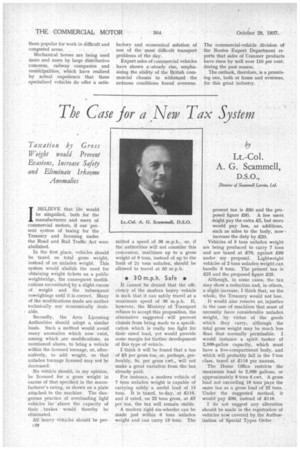The Case for a New f a System
Page 90

If you've noticed an error in this article please click here to report it so we can fix it.
Lt.-Col.
A. G. Scammell, D.S.O.,
.Director of Seammell Lorries, Lid.
Taxation by Gross Irea:ght would , Prevent Evasions, Increase Safety and Eliminate Irksome Anomalies
IBELIEVE that life would be simplified, both for the
manufacturers and users of commercial motors, if our present system of taxing for the Treasury and licensing under the Road and Rail Traffic Act were abolished.
In the first place, vehicles should be taxed on total gross weight, instead of on unladen weight. This system would abolish the need for obtaining weight tickets on a public weighbridge, the consequent modifications necessitated by a slight excess of weight and the -subsequent reweighings until it is correct. Many of the modifications made are neither technically nor economically desirable.
Secondly, the Area Licensing Authorities should adopt a similar basis. Such a method would avoid many anomalies which now exist, among which Are modifications, as mentioned above, to bring a vehicle within the licensed tonnage, or, alternatively, to add. weight, so that unladen tonnage licensed may not be decreased. • No vehicle should, in my opinion, be licensed for a gross weight in excess of that specified in the manufacturer's rating, as shown on a plate attached to the machine. The dangerous practice of overloading light vehicles far• above the capacity of their brakes would thereby be eliminated.
All heavy Vehicles should be perc28 mated a speed of 30 m.p.h., or, if the authorities will not consider this concession, machines up to a gross weight of 9 tons, instead of up to the limit of 21 tons unladen, should be allowed to travel at 30 m.p.h.
e 30 m.p.h. Safe •
It cannot be denied that the efficiency of the modern heavy vehicle is such that it can safely travel at a maximum speed of 30 'm.p.h. If, however, the Ministry of Transport refuses to accept this proposition, the alternative suggested will prevent chassis from being made to a specification which is really too light for their rated load, yet would provide some margin for further development of this type of vehicle.
I think it will be found that a tax of £5 per gross ton, or, perhaps, preferably, 5s. per gross cwt., will not make a great variation from the tax already paid.
For instance, a modern vehicle of 7 tons unladen weight is capable of carrying safely a useful load of 15 tons. It is taxed, to-day, at elm and if rated, on 22 tons gross, at £5 per ton, the tax will remain stable.
A modern rigid six-wheeler can be made just within 6 tons unladen weight and can carry 13 tons. The -present tax is £90 and the proposed figure £95. A few users might pay the extra £5, but more would pay less, as additions, such as sides to the body, now • increase the duty by £20.
Vehicles of 5 tons unladen weight are being produced to carry 7 tons and are taxed at £70, against £60 under my proposal. Lightweight vehicles of 2 tons unladen weight can handle 3 tons. The present tax is 225 and the proposed figure £25.
Although, in some cases, the tax may show a reduction and, in others, a slight increase, I think that, on the whole, the Treasury would not lose.
It would also remove an. injustice in the case of machines that must of necessity have considerable unladen weight, by virtue of the goods which they carry, although the total gross weight may be much less than that normally permissible. I would instance a spirit tanker of 2,500-gallon capacity, which must have a five-compartment body, and which will probably fall in the 7-ton class, taxed at 2110 per annum.
The Home Office restricts the maximum load to 2,500 gallons, or approximately 8 tons 6 cwt. A gross load not exceeding 16 tons pays the same tax as a gross load of 22 tons. Under the suggested method, it would pay £80, instead of £110.
I do not suggest any alteration should be made in the registration of vehicles now_ covered by the Authorization of Special Types Order.
























































































































































































